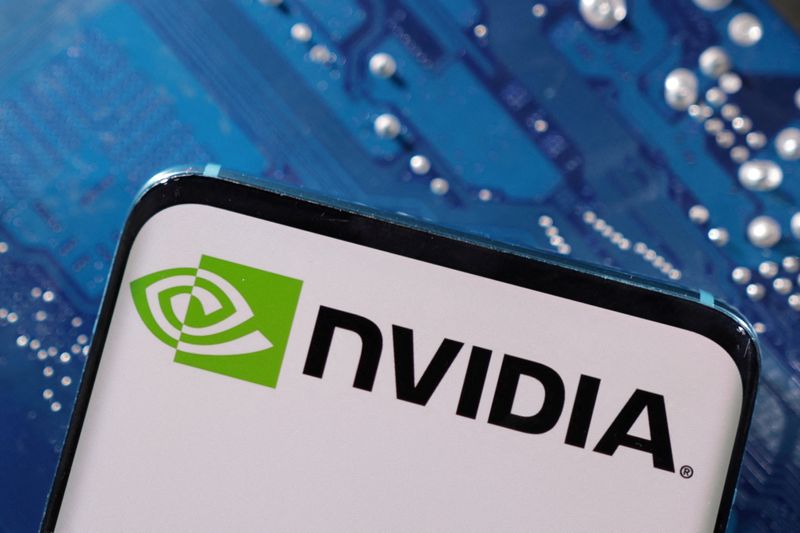Investing.com’s stocks of the week
By Sinéad Carew and Noel Randewich
NEW YORK/SAN FRANCISCO (Reuters) -Even after Nvidia (NASDAQ:NVDA) Corp's blistering rally in recent days, the chip developer's valuation has actually fallen, at least by one measure widely used by analysts and investors.
The chip developer has risen more than 31% in the last three sessions including a 3% gain on Tuesday to $401.11. At one point during the session, its market capitalization surpassed $1 trillion.
Nvidia now trades at around 45 times Wall Street's average earnings estimates for the next 12 months - a popular measure known as the forward price/earnings (P/E) ratio. But it had traded at a multiple of 62 on May 18, roughly a week before Nvidia's quarterly update sent the market into a frenzy, according to data from Refinitiv.
While investors rushed to buy Nvidia's stock in recent sessions, its P/E multiple has fallen simply because Wall Street's earnings expectations for the company rose even faster than its share price.
The consensus Wall Street expectation for Nvidia's second-quarter earnings per share has risen to $2.05, with analysts increasing their targets by an average of 95% while they increased their full-year EPS estimates by 71% to $7.75.
That came after Nvidia last Wednesday forecast current quarter revenue more than 50% above Wall Street estimates, with Chief Executive Officer Jensen Huang saying the company is "significantly increasing our supply to meet surging demand" for data center chips.
Analysts raised their price targets to a median of $450 from $300 at the end of last month, according to data collected by Refinitiv. But still they debated whether the company would be able to live up to the hype.
"Investors are waiting to see if the current strength this year is indicative of a new trajectory," said Bernstein analyst Stacy Rasgon.
The high valuation ahead of the quarterly report reflected bets that estimates were too low, he said, adding that "we’ll see if that happens again."
While investors are excited about the sudden jump in Nvidia's revenue, they will have to watch for problems such as supply chain pressure, said Susannah Streeter, head of money and markets at Hargreaves Lansdown, who sees the potential for such bumps bringing price volatility.
"Nvidia has a front seat on the AI juggernaut and the step change in growth is unlikely to be short lived but hyper-growth of this scale will also bring challenges," said Streeter.
During Tuesday's session, Nvidia became the first chipmaker to boast a $1 trillion valuation. It ended the session with market cap of about $991 billion, and Nvidia remains more richly valued than rivals including Advanced Micro Devices (NASDAQ:AMD), which has a forward P/E of about 38.
It is also the biggest year-to-date percentage gainer in the S&P 500, up almost 175% so far in 2023 compared with the S&P 500's almost 10% gain and an almost 119% gain for Meta Platforms, the next biggest gainer in the benchmark.
AI has been a dominant theme for companies reporting quarterly earnings in recent weeks, with the term mentioned almost 900 times on investor conference calls held by S&P 500 companies, according to a Reuters analysis. AI was mentioned 86 times on Nvidia's conference call, beating out 52 mentions on Alphabet (NASDAQ:GOOGL)'s call and 35 mentions on Microsoft (NASDAQ:MSFT)'s call.
